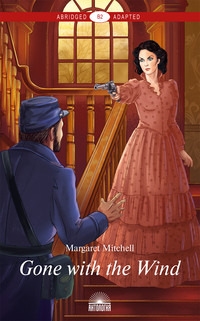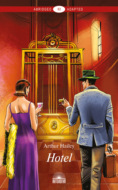Kitap dosya olarak indirilemez ancak uygulamamız üzerinden veya online olarak web sitemizden okunabilir.
Kitabı oku: «Gone with the Wind / Унесённые ветром», sayfa 4
Her heart in her throat, she went swiftly down the stairs. What if she should meet Mr. Wilkes? What excuse could she give for walking about the house when all the other girls were getting their beauty naps? Well, that had to be risked.
Across the wide hall was the open door of the library and she entered it noiselessly. She could wait there until Ashley finished his adieux and then call to him when he came into the house.
The library was in semidarkness. Large numbers of books always depressed her, as did people who liked to read them. That is – all people except Ashley. She closed the door except for a crack and tried to make her heart beat more slowly. She tried to remember just exactly what she had planned last night to say to Ashley, but she couldn’t recall anything. All she could think of was that she loved him. Oh, if only he would walk in on her now and take her in his arms, so she wouldn’t have to say anything. He must love her – “Perhaps if I prayed —” She squeezed her eyes tightly22 and began saying to herself “Hail Mary, full of grace —”
“Why, Scarlett!” said Ashley’s voice. He stood in the hall looking at her through the partly opened door, a smile on his face.
“Who are you hiding from – Charles or the Tarletons?”
He entered, puzzled but interested. Automatically he closed the door behind him and took her hand.
“What is it?” he said, almost in a whisper.
At the touch of his hand, she began to tremble. It was going to happen now, just as she had dreamed it.
“What is it?” he repeated. “A secret to tell me?”
Suddenly she found her tongue and just as suddenly all the years of Ellen’s teachings fell away, and the Irish blood of Gerald spoke from his daughter’s lips.
“Yes – a secret. I love you.”
For an instance there was a silence. And then her eyes sought his.
There was a look of surprise in them and something more – what was it? Then something like a well-trained mask came down over his face and he smiled gallantly.
“Isn’t it enough that you’ve collected every other man’s heart here today?” he said, with the old, teasing note in his voice. “Well, you’ve always had my heart, you know.”
Something was wrong – all wrong! This was not the way she had planned it. For some reason, Ashley was acting as if he thought she was just flirting with him. But he knew differently. She knew he did.
“Ashley – Ashley – tell me – you must – oh, don’t tease me now! Have I your heart? Oh, my dear, I lo —”
His hand went across her lips, swiftly. The mask was gone.
“You must not say these things, Scarlett! You mustn’t. You don’t mean them. You’ll hate yourself for saying them, and you’ll hate me for hearing them!”
She jerked her head away. “I couldn’t ever hate you. I tell you I love you and I know you must care about me because —” She stopped. Never before had she seen so much misery in anyone’s face. “Ashley, do you care – you do, don’t you?”
“Yes,” he said dully. “I care.”
She plucked at his sleeve, speechless.
“Scarlett,” he said, “can’t we go away and forget that we have ever said these things?”
“No,” she whispered. “I can’t. What do you mean? Don’t you want to – to marry me?”
He replied, “I’m going to marry Melanie.”
Somehow she found that she was sitting on the low velvet chair and Ashley, at her feet, was holding both her hands in his, in a hard grip. He was saying things – things that made no sense. Her mind was quite blank, quite empty of all the thoughts. His words fell on unhearing ears, words that were tender and full of pity, like a father speaking to a hurt child.
“Father is to announce the engagement tonight. We are to be married soon. I should have told you, but I thought you knew. I never dreamed that you – You’ve so many beaux. I thought Stuart —”
“But you just said you cared for me.”
His warm hands hurt hers.
“My dear, must you make me say things that will hurt you? Love isn’t enough to make a successful marriage when two people are as different as we are. You would want all of a man, Scarlett, his body, his heart, his soul, his thoughts. And I couldn’t give you all of me. And I would not want all of your mind and your soul. And you would be hurt, and then you would come to hate me! You would hate the books I read and the music I loved, because they took me away from you even for a moment.”
“Do you love her?”
“She is like me, part of my blood, and we understand each other. Can’t I make you see that a marriage can’t go on unless the two people are alike?”
“But you said you cared.”
“I shouldn’t have said it.”
Somewhere in her brain, a slow fire rose and rage began to blot out everything else.
“Well, having been cad enough to say it —”
His face went white.
“I was a cad to say it, as I’m going to marry Melanie. How could I help caring for you – you who have all the passion for life that I have not?”
She thought of Melanie, her gentle silences. And then her rage broke. There was nothing in her now of the well-bred Robillards.
“Why don’t you say it, you coward! You’re afraid to marry me! You’d rather live with that stupid little fool who can’t open her mouth except to say ‘Yes’ or ‘No’ and raise brats just like her! Why —”
“You must not say these things about Melanie!”
“Who are you to tell me I mustn’t? You coward, you cad, you – You made me believe you were going to marry me —”
“Be fair,” his voice pleaded. “Did I ever —”
She did not want to be fair, although she knew what he said was true. He had never once crossed the borders of friendliness with her and, when she thought of this her anger rose, the anger of hurt pride and feminine vanity. She had run after him and he would have none of her.
She sprang to her feet, her hands clenched and he rose towering over her. “I shall hate you till I die, you cad – you lowdown – lowdown —” What was the word she wanted? She could not think of any word bad enough.
“Scarlett – please —”
He put out his hand toward her and, as he did, she slapped him across the face with all the strength she had. The noise cracked like a whip in the still room and suddenly her rage was gone, and there was emptiness in her heart.
The red mark of her hand showed plainly on his white tired face. He said nothing but lifted her hand to his lips and kissed it. Then he was gone before she could speak again, closing the door softly behind him.
She sat down again very suddenly, her knees feeling weak. He was gone and the memory of his face would haunt her till she died. She had lost him forever. Now he would hate her and every time he looked at her he would remember how she threw herself at him when he had given her no reason at all.
Her hand dropped to a little table beside her, fingering a tiny china rose-bowl. The room was so still she almost screamed to break the silence. She must do something or go mad. She picked up the bowl and threw it viciously across the room toward the fireplace.
“This,” said a voice from the depths of the sofa, “is too much.”
Nothing had ever frightened her so much, and her mouth went too dry for her to utter a sound. She caught hold of the back of the chair, her knees going weak under her, as Rhett Butler rose from the sofa where he had been lying and made her a bow of politeness.
“It is bad enough to have an afternoon nap disturbed by such a passage as I’ve been forced to hear, but why should my life be endangered?”
He was real. He wasn’t a ghost. But he had heard everything!
“Sir, you should have made known your presence.”
“Indeed?” His white teeth gleamed and his bold dark eyes laughed at her.
Her temper was beginning to rise again at the thought that this rude and impertinent man had heard everything – heard things she now wished she had never uttered.
“Eavesdroppers —” she began furiously.
“Eavesdroppers often hear very entertaining and instructive things,” he grinned.
“Sir,” she said, “you are no gentleman!”
“A true observation,” he answered airily. “And, you, Miss, are no lady.” He seemed to find her very amusing, for he laughed softly again. “No one can remain a lady after saying and doing what I have just overheard. However, ladies have seldom held any charms for me. I know what they are thinking, but they never have the courage to say what they think. But you, my dear Miss O’Hara, are a girl of rare spirit, and I take off my hat to you. I can’t understand what charms the elegant Mr. Wilkes can hold for a girl of your nature. He should thank God for a girl with your – how did he put it? – ‘passion for living,’ but being a poor-spirited wretch —”
“You aren’t fit to wipe his boots!” she shouted in rage.
He sank down on the sofa and she heard him laughing.
If she could have killed him, she would have done it. Instead, she walked out of the room with dignity and banged the heavy door behind her.
She went up the stairs so swiftly that when she reached the landing, she thought she was going to faint.
She tried to quiet her heart, for she knew she must look like a crazy woman. If any of the girls were awake, they’d know something was wrong. And no one must ever, ever know that anything had happened.
Through the wide window she could see the men still lounging in their chairs under the trees. As she stood watching them, she heard the rapid pounding of a horse’s hooves on the front drive and a man on horseback galloped over the green lawn toward the group under the trees.
She could not recognize him, but the crowd gathered around him. In spite of the distance, she could hear the hubbub of voices. As she watched, the four Tarletons followed by the Fontaine boys broke from the group and ran toward the stable, yelling, “Jeems! Saddle the horses!”
“Somebody’s house must have caught fire,” Scarlett thought. But fire or no fire, her job was to get herself back into the bedroom before she was discovered.
Her heart was quieter now and she went up the steps into the silent hall. Carefully, she opened the door of the dressing room and slipped in. Honey Wilkes’ voice, almost in a whisper, came to her through the crack of the opposite door leading into the bedroom.
“I think Scarlett acted as fast as a girl could act today.”
Scarlett felt her heart begin its mad racing again. But the next voice made her pause as she heard Melanie’s voice.
“Oh, Honey, no! Don’t be unkind. She’s just vivacious. I thought her most charming.”
“Well, Miss,” said Honey tartly, her voice rising, “you must be blind. Well, you saw how she was carrying on with every man she could get hold of – even Mr. Kennedy and he’s her own sister’s beau. I never saw the like! And she certainly was going after Charles.” Honey giggled self-consciously. “And you know, Charles and I —”
“Are you really?” whispered other voices excitedly.
“Well, don’t tell anybody, girls – not yet!”
There were more giggling, then Melanie murmured something about how happy she was that Honey would be her sister.
“Well, I won’t be happy to have Scarlett for my sister, because she’s a fast piece23. And if you should ask me,” said Honey with mysterious importance, “there’s only one person she cares about. And that’s Ashley!”
Scarlett felt herself go cold with fear and humiliation. Honey was a fool, a silly, but she had a feminine instinct about other women that Scarlett had underestimated.
Melanie’s voice, peaceful and a little reproving, rose above the others.
“Honey, you know that isn’t so. And it’s so unkind.”
“It is true, Melly, and if you weren’t always looking for the good in people that haven’t got any good in them, you’d see it. And I’m glad it’s so. It serves her right24. All Scarlett O’Hara has ever done has been to make trouble and try to get other girls’ beaux.”
“I must get home!” thought Scarlett. “I must get home!”
If she could only be transferred by magic to Tara and to safety. If she could only be with Ellen, just to see her, to hold onto her skirt, to cry and pour out the whole story.
Home, she thought, as she sped down the hall, I must go home.
She was already on the front porch when a new thought came – she couldn’t go home! To run away would only give them more evidence.
She pounded her clenched fist against the tall white pillar beside her. She’d make them sorry. She’d show them. She didn’t quite see how she’d show them, but she’d do it all the same. She’d hurt them worse than they hurt her.
For the moment, Ashley was forgotten. Vanity was stronger than love at sixteen and there was no room in her hot heart now for anything but hate.
“I won’t go home,” she thought. “I’ll stay here and I’ll make them sorry. And I’ll never tell Mother. No, I’ll never tell anybody.”
As she turned, she saw Charles coming into the house from the other end of the long hall. When he saw her, he hurried toward her. His face was red with excitement.
“Do you know what’s happened?” he cried, even before he reached her. “Have you heard?”
He paused, breathless, as he came up to her. She said nothing and only stared at him.
“Mr. Lincoln has called for men, soldiers – I mean volunteers – seventy-five thousand of them!”
Mr. Lincoln again! Didn’t men ever think about anything that really mattered? Here was this fool expecting her to be excited about Mr. Lincoln’s didoes when her heart was broken and her reputation almost ruined.
Charles stared at her. Her face was paper white and her narrow eyes blazing like emeralds.
“I’m so clumsy,” he said. “I should have told you more gently. I’m sorry I’ve upset you so. You don’t feel faint, do you? Can I get you a glass of water?”
“No,” she said, and managed a crooked smile.
“Shall we go sit on the bench?” he asked, taking her arm.
She nodded and he carefully led her across the grass to the iron bench beneath the largest oak in the front yard. How fragile and tender women are, he thought, the mere mention of war makes them faint. The idea made him feel very masculine.
“He has a lot of money,” she was thinking fast. “And he hasn’t any parents to bother me and he lives in Atlanta. And if I married him right away, it would show Ashley that I didn’t care – that I was only flirting with him. And it would just kill Honey. She’d never, never catch another beau. And it would hurt Melanie, because she loves Charles so much. “And they’d all be sorry when I came back here to visit in a fine carriage and with lots of pretty clothes and a house of my own. And they would never, never laugh at me.”
“Of course, it will mean fighting,” said Charles. “But don’t you worry, Miss Scarlett, it’ll be over in a month. I wouldn’t miss it for anything. I’m afraid there won’t be much of a ball tonight, because the Troop is going to meet at Jonesboro. The Tarleton boys have gone to spread the news. I know the ladies will be sorry.”
Coolness was beginning to come back to her. Why not take this pretty boy? He was as good as anyone else and she didn’t care.
“Will you wait for me, Miss Scarlett? It – it would be Heaven just knowing that you were waiting for me until after we licked them!” He hung breathless on her words. Her hand slid into his.
“I wouldn’t want to wait,” she said.
He sat clutching her hand, his mouth wide open. Watching him from under her lashes, Scarlett thought that he looked like a frog. He stuttered several times, closed his mouth and opened it again, and again became red in the face.
“Can you possibly love me?”
She said nothing but looked down into her lap, and Charles was embarrassed. Perhaps a man should not ask a girl such a question. Perhaps it would be hard for her to answer it. Charles was at a loss as to how to act. He wanted to shout and to sing and to kiss her and then run tell everyone, black and white, that she loved him. But he only squeezed her hand until he drove her rings into the flesh.
“You will marry me soon, Miss Scarlett?”
“Um,” she said, fingering a fold of her dress.
“Shall we make it a double wedding with Mel —”
“No,” she said quickly. Charles knew again that he had made an error. Of course, a girl wanted her own wedding – not shared glory.
“When may I speak to your father?”
“The sooner the better,” she said.
He leaped up and for a moment she thought he was going to cut a caper25. He looked down at her radiantly, his clean simple heart in his eyes. She had never had anyone look at her thus before and would never have it from any other man, but she only thought that he looked like a calf.
“I’ll go now and find your father,” he said, smiling all over his face. “I can’t wait. Will you excuse me – dear?” The word came hard but having said it once, he repeated it again with pleasure.
“Yes,” she said. “I’ll wait here. It’s so cool and nice here.”
He went off across the lawn and disappeared around the house, and she was alone under the rustling oak. From the stables, men were streaming out on horseback, negro servants riding hard behind their masters.
The white house with its tall columns stood before her. It would never be her house now. Ashley would never carry her over the threshold as his bride. Oh, Ashley, Ashley! What have I done? Deep in her, under hurt pride and cold practicality, something stirred hurtingly. An adult emotion was being born. She loved Ashley and she had never cared for him so much as in that instant when she saw Charles disappearing around the graveled walk.
Chapter VII
Within two weeks Scarlett had become a wife, and within two months more she was a widow.
In after years when she thought of those last days of April, 1861, Scarlett could never quite remember details. Time and events were jumbled together like a nightmare. Especially vague were her memories of the time before the wedding. Two weeks! So short an engagement would have been impossible in times of peace. But the South was at war.
Learning that Ashley’s wedding had been moved up to the first of May, so he could leave with the Troop, Scarlett set the date of her wedding for the day before his. Ellen protested but Charles was impatient to be off to South Carolina to join the Legion, and Gerald sided with the two young people.
The South was intoxicated with enthusiasm and excitement. Everyone knew that one battle would end the war and every young man hastened to enlist before the war should end – hastened to marry his sweetheart before he went to Virginia to strike a blow at the Yankees. The ladies were making uniforms, knitting socks and rolling bandages, and the men were drilling and shooting. Train loads of troops passed through Jonesboro daily on their way north to Atlanta and Virginia. All were half-drilled, half-armed, wild with excitement and shouting as though on the way to a picnic.
Almost before she knew it, Scarlett was wearing Ellen’s wedding dress and veil, coming down the wide stairs of Tara on her father’s arm, to face a house packed full with guests. Afterward she remembered, as from a dream, the hundreds of candles flaring on the walls, her mother’s face, her lips moving in a silent prayer for her daughter’s happiness, Gerald flushed with brandy and pride that his daughter was marrying both money and a fine name – and Ashley, standing at the bottom of the steps with Melanie’s arm through his.
When she saw the look on his face, she thought: “This can’t be real. It can’t be. It’s a nightmare. I’ll wake up and find it’s all been a nightmare. I mustn’t think of it now, or I’ll begin screaming in front of all these people. I can’t think now. I’ll think later, when I can stand it – when I can’t see his eyes.”
It was all very dreamlike. Even the feel of Ashley’s kiss upon her cheek, even Melanie’s soft whisper, “Now, we’re really and truly sisters,” were unreal.
But when the dancing and toasting were finally ended and the dawn was coming, there came reality. The reality was the blushing Charles, emerging from her dressing room in his nightshirt, avoiding the look she gave him over the high-pulled sheet.
Of course, she knew that married people occupied the same bed but she had never given the matter a thought before. It seemed very natural in the case of her mother and father, but she had never applied it to herself. Now for the first time she realized just what she had brought on herself. The thought of this strange boy getting into bed with her, when her heart was breaking for losing Ashley forever, was too much for her. As he approached the bed she spoke in a hoarse whisper.
“I’ll scream out loud if you come near me. I will! I will – at the top of my voice! Get away from me! Don’t you dare touch me!”
So Charles Hamilton spent his wedding night in an armchair in the corner, not too unhappily, for he understood, or thought he understood, the modesty and delicacy of his bride.
Ashley’s wedding was even worse. She saw the plain little face of Melanie Hamilton glow into beauty as she became Melanie Wilkes. Now, Ashley was gone forever. Her Ashley. No, not her Ashley now. Had he ever been hers? Now he was gone and she was married to a man she did not love.
So she danced through the night of Ashley’s wedding in a daze and said things mechanically and smiled at the people who thought her a happy bride and could not see that her heart was broken. Well, thank God, they couldn’t see!
That night after Mammy had helped her undress and had departed and Charles had emerged shyly from the dressing room, wondering if he was to spend a second night in the chair, she burst into tears. She cried until Charles climbed into bed beside her and tried to comfort her till at last she lay sobbing quietly on his shoulder.
A week after the wedding Charles left to join the Legion, and two weeks later Ashley and the Troop departed.
In those two weeks, Scarlett never saw Ashley alone, never had a private word with him. Not even at the terrible moment of parting, when he stopped by Tara on his way to the train. Melanie, hanging on his arm, said: “You must kiss Scarlett, Ashley. She’s my sister now,” and Ashley bent and touched her cheek with cold lips, his face drawn. “You will come to Atlanta and visit me and Aunt Pittypat, won’t you? We want to know Charlie’s wife better.”
Five weeks passed during which letters came from Charles telling of his love, his plans for the future when the war was over, his desire to become a hero for her sake. In the seventh week, there came a telegram that Charles was dead. He had died of pneumonia, following measles, without getting any closer to the Yankees than the camp in South Carolina.
Scarlett’s boredom was acute. There had been no entertainment or social life in the County ever since the Troop had gone away to war. All of the interesting young men were gone. Only the older men, the cripples and the women were left, and they spent their time knitting and sewing, growing more cotton and corn, raising more hogs and sheep and cows for the army. There was never a sight of a real man except when the commissary troop under Frank Kennedy rode by every month to collect supplies. But it didn’t help her situation. She was a widow and her heart was in the grave. At least, everyone thought it was in the grave and expected her to act accordingly. This irritated her for she could recall nothing about Charles except the look on his face when she told him she would marry him. And even that picture was fading. But she was a widow and she had to watch her behavior. Not for her the pleasures of unmarried girls.
A widow had to wear black dresses, no flower or ribbon or lace or even jewelry. And the black veil on her bonnet had to reach to her knees, and only after three years of widowhood could it be shortened to shoulder length. Widows could never chatter vivaciously or laugh aloud. Even when they smiled, it must be a sad, tragic smile. And, most dreadful of all, they could in no way indicate an interest in the company of gentlemen. Oh, yes, thought Scarlett, some widows do remarry eventually, when they are old. And then it’s to some old widower with a large plantation and a dozen children.
Marriage was bad enough, but to be widowed – oh, then life was over forever!
Every morning she woke up and for a moment she was Scarlett O’Hara again and the sun was bright in the magnolia outside her window and the birds were singing and the sweet smell of frying bacon was coming to her nostrils. She was carefree and young again. But that moment passed very fast.
And Ashley! Oh, most of all Ashley! For the first time in her life, she hated Tara. Every foot of ground, every tree, every path reminded her of him. He belonged to another woman and he had gone to the war, but his ghost still haunted the roads, still smiled at her in the shadows of the porch. And every time she heard the sound of hooves coming up the river road from Twelve Oaks she did think – Ashley!
She hated Twelve Oaks now and once she had loved it. She hated it but she was drawn there, so she could hear John Wilkes and the girls talk about him – hear them read his letters from Virginia. They hurt her but she had to hear them. She disliked his sisters, but she could not stay away from them. And every time she came home from Twelve Oaks, she lay down on her bed and refused to get up for supper.
It was this refusal of food that worried Ellen, but Scarlett had no appetite. When Dr. Fontaine told Ellen that heartbreak frequently led to a decline and death, Ellen went white.
“Isn’t there anything to be done, Doctor?”
“A change of scene will be the best thing in the world for her,” said the doctor.
So Scarlett, unenthusiastic, went off first to visit her O’Hara and Robillard relatives in Savannah and then to Ellen’s sisters, Pauline and Eulalie, in Charleston. But she was back at Tara a month before Ellen expected her, with no explanation of her return.
Ellen, busy night and day, was terrified when her eldest daughter came home from Charleston thin, white and sharp tongued. She had known heartbreak herself, and night after night she lay beside the snoring Gerald, trying to think of some way to lessen Scarlett’s distress. Charles’ aunt, Miss Pittypat Hamilton, had written her several times, asking her to permit Scarlett to come to Atlanta for a long visit, and now for the first time Ellen considered it seriously.
She and Melanie were alone in a big house “and without male protection,” wrote Miss Pittypat, “now that dear Charlie has gone. Of course, there is my brother Henry but he does not make his home with us. Melly and I would feel much easier and safer if Scarlett were with us. Three lonely women are better than two. And perhaps dear Scarlett could find some outlet for her sorrow, as Melly is doing, by nursing our brave boys in the hospitals here.”
So Scarlett’s trunk was packed again with her mourning clothes and off she went to Atlanta. She did not especially want to go to Atlanta. She thought Aunt Pitty the silliest of old ladies and the very idea of living under the same roof with Ashley’s wife was awful. But the County with its memories was impossible now, and any change was welcome.








